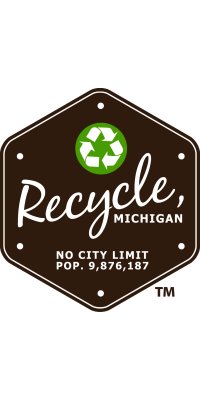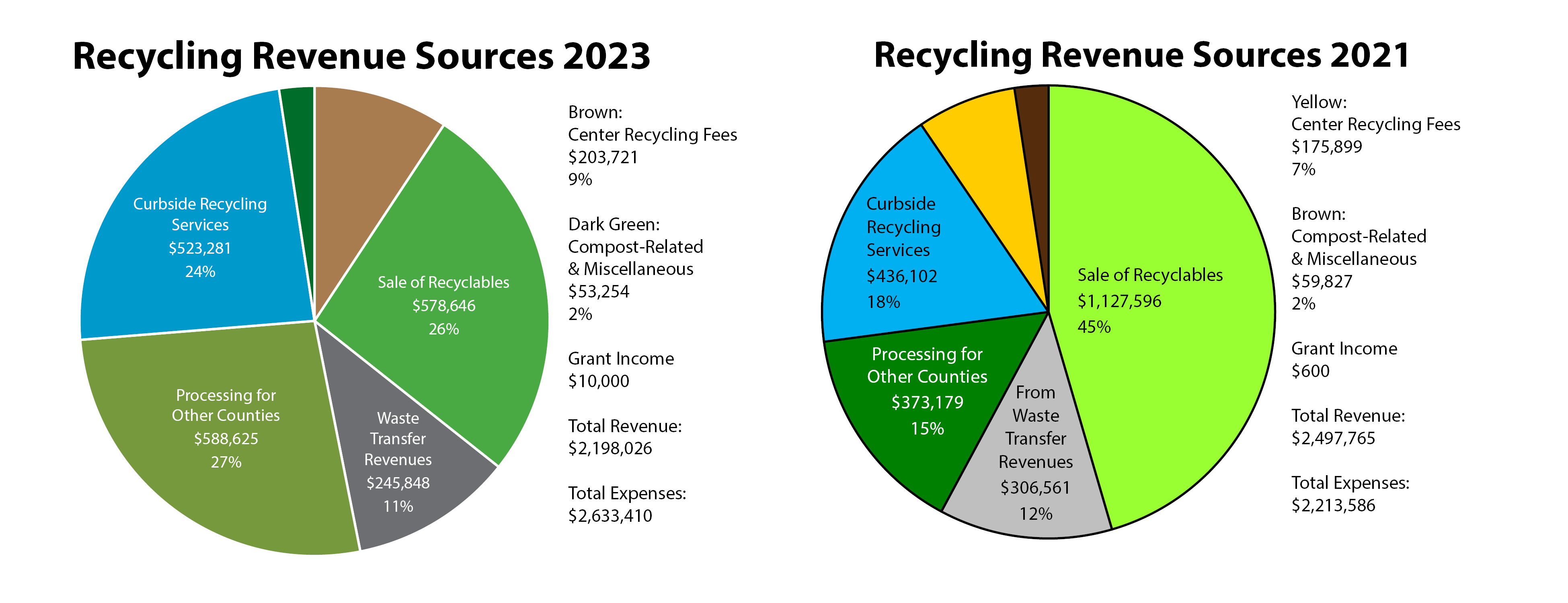BackgroundOrdinanceFundingPersonnelStatisticsPrintable Copy
Emmet County Department of Public Works
Vision
To have systems that make best practices for waste reduction, reuse, recycle, and disposal the northern Michigan way of life.
Mission
To provide opportunities and education for employees, residents, businesses, and neighboring communities to reduce waste, reuse, recycle and properly dispose of materials in order to preserve the natural beauty of our northern Michigan community.
Our Model

We are often approached by officials and citizens of communities which are starting or expanding recycling programs. Here’s the behind the scenes story of who we are, how our programs came to be, how they’re administered and funded, and where we are today.
What’s Special About the Emmet County Model?
Emmet County’s waste, recycling and composting systems stand out for several reasons:
The system is:
- Sustainable (35 years!)
- Comprehensive (60 materials recovered via 12 drop-sites, curbside collection, our comprehensive drop-off center, and a food scraps collection program)
- Thriving (over 80% of county residents use the recycling program)
Further,
- Our system does not rely on County tax dollars.
- With a pay-as-you-throw provision in the solid waste ordinance, the County has built-in an economic incentive for residents and businesses to recycle, compost and reduce their waste.
- The system offers a great value: Emmet County residents essentially get a “package deal” for their waste disposal dollar as both recycling and household chemical disposal services are supported by County Transfer Station revenues.
- The system thoughtfully combines the strengths of the public and private sectors to best serve the interest of the citizens and businesses of Emmet County.
Background
Located in the northern tip of Michigan’s Lower Peninsula, Emmet County is largely rural, with a population of roughly 34,000 people. The county’s Department of Public Works (DPW) operates cost-effective, self-funded facilities which offer comprehensive recycling, resource recovery, and solid waste transfer services.
Emmet County’s Department of Public Works (DPW) was established in the late 1970s and has owned and operated a solid waste transfer station since 1978. The department’s first full-time director, Elisa L. Seltzer, was hired in 1990 and was charged with implementing the County’s 1988 Solid Waste Management Plan Update which called for establishment of County recycling and household hazardous waste programs. Using the County's state-mandated Solid Waste Plan as a road map, the director and the DPW Board started with three steps: 1) a funding committee was established, 2) a solid waste ordinance was drafted, and 3) intergovernmental agreements were signed with participating townships and municipalities.
The Ordinance
The Emmet County Solid Waste Ordinance (at bottom of page) requires waste haulers to be licensed by the County. In being licensed, the haulers contractually agree to comply with the Ordinance.
A key provision of the Ordinance requires that waste haulers use the County Transfer Station. This serves to preserve competition by leveling the disposal cost “playing field” for the various waste haulers – local, regional, national, and multinational companies; those who earn thousands and those who earn billions; those who own landfills and those who do not. It also helps provide stable funding for the County’s Recycling and household hazardous waste programs. See “Funding,” below.
The ordinance also contains a “Pay-As-You-Throw” provision (PAYT) specifying that waste disposal fees must be based on volume (i.e. per bag, cart, or yard) rather than at a flat rate (i.e. a flat monthly rate covering any amount set out). Under PAYT each household or business takes responsibility for the amount of waste they generate: if they generate less garbage they save money, if they generate more garbage they pay proportionately more.
Anti-Scavenging Policy Per Emmet County Solid Waste Ordinance
No person shall take, collect or transport any refuse, yard waste, or recyclable material from any street right-of-way, alley or dumpster which has been designated for collection by a public agency or licensed hauler. This includes materials that have been placed at a drop-off location, at the edge of a curb, road or alley, or other designated collection site. Materials so restricted shall be placed in a well-marked container, stating the name of the authorized collection agent. An exception to this provision shall be annual bulk clean-ups sponsored by a local unit of government whereby scavenging of materials set out for refuse pick up reduces the volume of reusable material being landfilled.
Funding
Emmet County Recycling (ECR) was initially equipped under a millage collecting .25 mils for 2 years. This provided for a truck, drop-off containers, and processing equipment. State grants assisted in funding initial construction and equipment.
The recycling program’s primary sources of income are sale of recyclables and contractual services. Notably, the County's Transfer Station rates are consistently among the lowest in the region. Transfer Station revenues help bridge any funding gaps to operate the County’s 12 recycling drop sites and the MRF.
The DPW operates its own dual stream materials recovery facility, markets the recyclables collected, and receives the resulting revenues. Income from the sale of recyclables covers a substantial portion of the operating costs for recycling collection and processing. This not only provides significant benefit to the community by creating jobs and services, but also prevents unnecessary expenditure on landfill disposal.
Markets for materials exhibit variability on a monthly and yearly basis. Our analysis comparing revenues from 2021 to 2023 reveals fluctuations in the percentage contributions from different revenue streams, including the sale of recyclables, processing fees, and contracted curbside services.
From 1992-1999 Emmet County Recycling received no tax dollars. As private waste and recycling service providers do, ECR now indirectly receives some tax monies for services provided under contracts. Specifically, Presque Isle and Cheboygan counties have millages or fees to fund recycling for their citizens and they pay Emmet County to process their recyclables. ECR also has contracts with six municipalities to provide curbside collection of recyclables for their residents (60% of the County’s total households). The curbside communities pay for the service from their general funds.

Personnel and Contractors
County employees staff the Transfer Station, administrative offices, service the recycle drop sites, drive the curbside recycling routes, and operate the MRF. Historically, the DPW employed individuals from a sheltered workshop and contract workers. However, in 2022 the sheltered workshop stopped supplying a crew due to COVID and in 2021, amid nationwide labor shortages, our last contract workers were hired as county employees.
The DPW contracts with private sector companies to provide services where numerous, viable vendors make competitive bids possible, like hauling and disposal of waste from the Transfer Station. Contract language features built-in incentives to protect and promote the program’s interests and vision and also emphasizes public ownership and control. Waste hauling from Emmet County homes and businesses is provided entirely by private waste haulers contracting directly with the customers.
2023 Statistics
- Over 40% of Emmet County’s waste stream was recovered
- 4,041,555 million pounds of food scraps composted since 2015
- 12,173 tons of material were processed and marketed for recycling through the Emmet County Recycling Center
Solid Waste Ordinance 11-04
Emmet County’s new Solid Waste Ordinance 11-04 replaces the previous 99-40 Solid Waste Ordinance.
